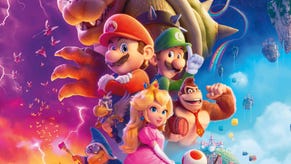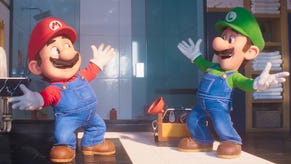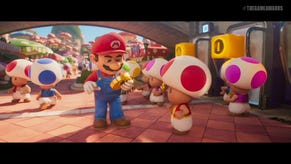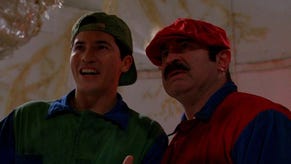Super Mario's Maestro: A Q&A with Nintendo's Koji Kondo
The composer behind some of gaming's most legendary tunes reflects on the many changes he's experienced in his 30-year career at Nintendo.
This article first appeared on USgamer, a partner publication of VG247. Some content, such as this article, has been migrated to VG247 for posterity after USgamer's closure - but it has not been edited or further vetted by the VG247 team.
USg: One of the keys to Super Mario Bros.' sonic success was the syncopation of the music and sound effects, both of which you created. One, do you still work on general audio design or just composition? And two, do you think that sort of harmony between score and effects is easier or more difficult in today's games?
KK: The staff for games now are much, much larger than they used to be, so part of my job is to make sure the folks that are working on the sound effects are having regular talks with the people in charge of the music. We make sure the direction of the sound effects and the direction of the music are in alignment, and we really make sure those people are working and talking together [in regard to] timing and syncopation—that sort of seamless transition between the two is something we focus on a lot.
If you're looking at it from just a technological viewpoint, the things we can do now, the effects we can create, the music we can put into games—the scope is much wider. There's a lot more we can do, and the technology makes it easier. That being said, we have a larger staff, and getting all the staff members on the same page, and making sure we're all in alignment, and our thought processes are the same and we're all striving to reach same goal... It's more difficult than it used to be. There's a balance there: The technology makes it easier, but the increased number of staff members makes it more difficult.
USg: How much autonomy are you given in creating music? Who decides the general tone?
KK: Most of the directors let us do what we want. They say, "Hey, we want music. Please create music for us." And that's the end of their direction. But some of the directors are much more hands-on. They'll say, "Hey, I want this kind of music for this section." And they might bring some sample music and say, "I want something that's in line with this." So it really depends on the director, but for the most part, we are given autonomy when creating game music.
USg: Is this what you prefer?
KK: It's weird to be given autonomy when they say, "Here's our game, play it and create music for us." There's a lot of homework involved. We play the game again and again, and we try to think of music that would be right for it, and maybe we go out and listen to different kinds of music and instruments. Trying to find what we think is the right match for that game, it's tough and challenging, but it's a heck of a lot of fun, and we really enjoy doing that.
On the other hand, if we're working with a director who comes in and says, "I would like this type of music," and has some samples and offers some hands-on direction... That eliminates some of that background homework we have to do, but we then really have to sit and make sure we understand what the director's looking for. So there's a lot of back and forth. Trying to narrow it down to what the director really needs more so than what he or she wants... Sometimes they will say "I want this out of this music," when it might be something a little bit different. And that's our job: to narrow that down and pull that out of some of the samples they bring. So [both approaches] have their challenges.
USg: I've noticed that, more than other video game developers, Nintendo goes for a more eclectic tone with their music, using styles and instruments that aren't the most obvious choices—the saxophone solos in Mario Kart 8 are a good example of this. Do you intentionally try to think outside the box when making decisions about a game's soundtrack?
KK: I think our underlying premise, our underlying job here... is [creating] music that makes the games more interesting and more fun. We really want to highlight what's happening on the screen. If you look at Mario Kart 8—and I think that's a game with really, really good music—they looked at the different tracks, the different backgrounds, where the people are racing, what they're seeing while they're racing. And they really wanted to go through and change the style of music based on the type of game play that's happening: That includes changing the instrumentation, changing the tempo; again, really looking at what's on screen and trying to come up with music that highlights and enhances that experience for the end user.
The company doesn't come to us and say, "We need you to use a lot of different styles." For us, it really is looking at the games and, based on that overarching goal of making music that enhances and highlights the gaming experience... The end game is that we end up with a wide variety of styles.
USg: Can you talk about how you've witnessed the public perception of video game music change over the course of your career?
KK: We have overcome a lot of the hardware limitations that we used to see when creating game music. A lot of the game music we have today, if you were just playing it through some speakers without any on-screen images, I don't know if a lot of people would be able to tell if it was game music, or tv music, or a movie soundtrack. Previously, with the hardware limitations, you could listen to [video game music] and you'd be like, "Oh, this is definitely music from a video game because it doesn't have the full range you would find on a movie soundtrack or on a TV show or something like that." That limitation has gone away.
What does the general populace think about how game music has changed? Really, I think if people enjoy the game music, I don't think their perception of it is all that important. I think if they like the game music that was more limited by the hardware specification, that's great. If they enjoy what they're hearing now... then that's great as well. As long as people are enjoying what they're listening to, and as long as it's enhancing what's in the game, I think that how their perception has changed isn't something I'm all that focused on.
USg: Compared to the technology you were using in the mid-'80s, you ostensibly have the power to do anything. I'm just curious, though; what advancements still need to be made/or you predict will be made in the field of audio?
KK: Fundamentally, it's about increasing enjoyment of the game itself. I think we're going to see—and we need to see—more interactive music, the ability to match music and sound effects to what's happening on the screen, and to be able to transition between those and make the timing line up in a way that fundamentally increases the enjoyment of the game play. I think that's really the role of game music, and I think that's what we need to see.









